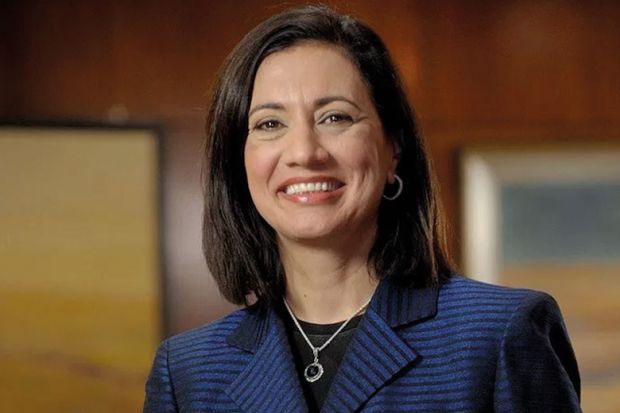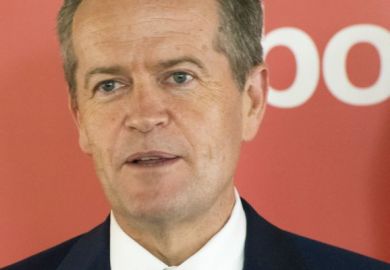That New Zealand is phasing out tuition fees just as South Africa prepares to introduce fee-free higher education for poorer students is an “interesting coincidence” for Cheryl de la Rey as she gets ready to take over at the University of Canterbury and leave her post as University of Pretoria vice-chancellor.
But Professor de la Rey, who was on the front line as government budget cuts hit and students protested against fees in South Africa, is unfazed by facing up to the funding freeze in New Zealand that has resulted from prime minister Jacinda Ardern’s campaign promise. “It’s a great opportunity for me to use my experience,” she told Times Higher Education. “It’s part of the new era of higher education,” she added.
Squeezed budgets are not new to Professor de la Rey, who has worked in various roles in higher education in South Africa for 20 years and will take over at Canterbury in February. “The South African economy has not grown as we would have liked, and that’s meant that we’ve gone through a period where our government subsidies haven’t kept pace with rising costs,” she said. “We had to become smarter and more efficient, while at the same time delivering on the two key objectives I set for the university: to grow our research intensity and to become more diverse.”
This meant that Pretoria had to be innovative in the way that it conducted its research and delivered its education, Professor de la Rey said. “I will be looking at ways that we can deliver that kind of innovation in New Zealand,” she added.
The difference between New Zealand and South Africa is that the former has implemented a system where the first year will be free tuition for all new students, as it phases out fees, whereas in South Africa the entire undergraduate degree will be free from this autumn, but only for the poorest students. “Even so [given these differences], there are lessons to be learned,” said Professor de la Rey of the two nations.
“It’s a great opportunity for young people,” she said. “I think for New Zealand’s communities, with a participation rate that is not as high as it should be, this is a way of promoting access.” Figures have shown a large disparity between higher education entry rates between Maori and Pasifika students, and New Zealanders of European descent.
“I certainly have had the experience at the University of Pretoria of ensuring that our student community has become more diverse, not only ethnically, linguistically and racially, but also in socio-economic background,” added Professor de la Rey, a psychologist who took over at Pretoria in 2009.
Pretoria largely escaped the protests surrounding the Rhodes Must Fall campaign, which Professor de la Rey attributes to the fact that the university does not have statues of colonialists decorating its campus, but rather modern artwork and sculptures.
It was, however, unable to escape the protests that spread across the nation during the Fees Must Fall movement. “That affected us, we had to draw on our resilience,” Professor de la Rey said.
When the protests were at their peak, the university quickly switched to using its online education tools. “We completed our academic year as scheduled despite the protests, because we had been using blended learning for 20 years,” she explained.
Resilience is a quality embodied in the way the city of Christchurch and the University of Canterbury have regenerated after the devastating earthquake of 2011, she said.
The New Zealand government has since invested NZ$260 million (£135 million) in the university’s rebuilding programme, and the university unveiled a landscape master plan in 2017. “I’m sure the government would like to see a return on its investment,” Professor de la Rey said. “But it’s created a unique opportunity for a university that is more than 100 years old to reinvent itself. I was really attracted to that.”
To achieve that transformation, the university needs to embrace new technologies, particularly to improve the output of the country’s traditional economic sectors, such as agriculture, Professor de la Rey said. “Through the research the university does, we can work with that sector on things like artificial intelligence and robotics to help it modernise.”
Another dimension of this reinvention is to work with local government on how the university’s strategy can align with its location. “Given that Christchurch has recently rebuilt, I think that working with the city, we could look at the concept of smarter cities, how to embrace smart transport for the public and how to embrace technology to improve services,” said Professor de la Rey.
“Civic engagement is important because New Zealand is a diverse society – it’s bicultural, it’s bilingual – and I bring experience of living in a diverse country, still undergoing its own societal transformation, and how to embrace that.”
Register to continue
Why register?
- Registration is free and only takes a moment
- Once registered, you can read 3 articles a month
- Sign up for our newsletter
Subscribe
Or subscribe for unlimited access to:
- Unlimited access to news, views, insights & reviews
- Digital editions
- Digital access to THE’s university and college rankings analysis
Already registered or a current subscriber? Login











